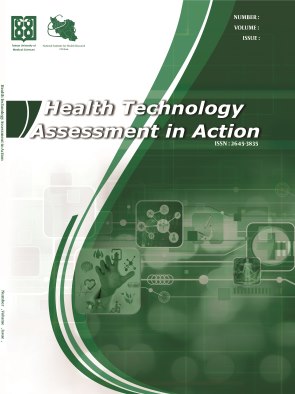Simulation of the Impact of Key Variables on Smart Supply Chains Efficiency in Iran’s Healthcare Industry
Abstract
Background: The smartification of supply chains, which enables organizations to stay informed about crises in a timely manner and make appropriate decisions in response to the resulting pressures, has consistently been a crucial factor in the realm of organizational transformation. The healthcare industry in Iran faces more challenges and crises than other industries, especially due to its vital role in public health prevention and care.
Objectives: According to the reasons described, this research aims to simulate and improve the efficiency of the healthcare supply chain when confronted with crises.
Methods: In this study, the efficiency of the healthcare supply chain was simulated using the system dynamics approach and Vensim DSS.
Results: The results indicated that healthcare supply chain efficiency in Iran is unsatisfactory and may confront challenges during crises. Therefore, this study places particular emphasis on examining scenarios for improving the current situation, which stems from the consensus of experts and stakeholders in this field. In the presented scenarios, a 2% improvement in the utilization of advanced intelligent technologies and a 5% improvement in intelligent inventory management were observed. Notably, the combined effect of these two
scenarios led to an overall enhancement in the average efficiency of the healthcare smart supply chain. These improvements can increase the average efficiency levels within the pharmaceutical manufacturing segment up to 1.3%, 5.8%, and 7.7% in each of the aforementioned scenarios.
Conclusions: It can be asserted that although the advancement of smart technologies and intelligent inventory management individually contribute to enhancing the efficiency of the healthcare supply chain in Iran, combining these changes can provide the groundwork for further increasing efficiency up to 7.7%.
2. Green, K. W., Jr., McGaughey, R., & Casey, K. M. Does supply chain management strategy mediate the association between market orientation and organizational performance? Supply Chain Management, 2012;11(5):407-414.
3. Cohen, S., and Roussel, J., Strategic supply chain management: The five disciplines for top performance. New York, NY: McGraw-Hill; 2005.
4. Manavizadeh, N, Rabbani, M, Rezaei, K, and Razmi, R, (2006), Performance Measurment of four key Business in Iran, 2nd National Conference on Logistics & Supply Chain, Tehran, Iran.
5. Mohagheghnejad, M., Nasiripour, A. A., Zaboli, R., Damghanian, H. model of factors affecting hospital services supply chain. Journal of Sabzevar University of Medical Sciences, 2022; 28(6): 959-969.
6. Hosseini, S. M. H., Hamidizadeh, M., Hajipoor, B., Hajikarimi, A. A Competitive Model of Supply Chain for Private Hospitals in Tehran, Iran. Health Information Management, 2018; 15(3): 106-113.1
7. Oliveira-Dias, D, Maqueira-Marín, M, Moyano-Fuentes, J, The link between information and digital technologies of industry 4.0 and agile supply chain: Mapping current research and establishing new research avenues, Computers & Industrial Engineering, 2022; 167.
8. Riquelme-Medina, M, Stevenson, M, Barrales-Molina, V, and Llorens-Montes, F, Coopetition in business Ecosystems: The key role of absorptive capacity and supply chain agility, Journal of Business Research, 2022; 146: 464-476.
9. Sadeghi, S, Akbarpour, A, and Abbasian Jahromi, H, (2022), Providing a Rewarding Supply Chain Strategy based on Lean, Agile and Sustainable Approaches in the Construction Industry, Seventh International Conference on Research in Science and Engineering and the 4th International Congress on Civil Engineering, Architecture and Urban Planning of Asia, Bangkok, Thailand.
10. Israel, E. F., Albert, A. E., Frazzon, M., & Hellingrath, B. Operational supply chain planning method for integrating spare parts supply chains and intelligent maintenance systems. ScienceDirect, 2017; 1(50): 12428-12433.
11. NiliporTabatabaei, A., Khayyambashi, B., Karbasian, M., Shariati, M. Optimizing the Usage of Information Technology in Supply Chain Management and Marketing of Aviation Products by AHP Approach. New Marketing Research Journal, 2012; 2(2): 143-164.
12. Rahchamani, S. M., Heydariyeh, S. A., Zargar, S. M. Designing a Model for Intelligent Service Supply Chain Based on Grounded Theory (Case Study: Omid Entrepreneurship Fund). Journal of Industrial Management Perspective, 2022; 12(Issue 2, Summer 2022): 89-111.
13. Rashidi Torbati, S., Radfar, R, Pilevari, N, Supply Chain Intelligence with IoT Approach(Case study: Companies active in the field of information and communication technology in Tehran province), Journal of Strategic Management in Industrial Systems, 2022; 16(58): 14-29.
14. Kazancoglu, I., Ozbiltekin-Pala, M, Kumar Mangla, S., Kazancoglu, Y, Jabeen, F., Role of flexibility, agility and responsiveness for sustainable supply chain resilience during COVID-19, Journal of Cleaner Production, 2022; Volume 362.
15. Fakhrzad, M. B., Keshavarz, M., Jafari Nodoushan, A. A mathematical model in the smart supply chain based on ICPT in the MTS environment. Modern Research in Decision Making, 2021; 6(2): 97-123.
16. Sargazi Moghaddam H., Shahsavari M., An overview of the role of intelligent software agents in supply chain management. Supply chain management, Iranian Journal of Supply Chain Management, 2016; 18(53): 14-26.
| Files | ||
| Issue | Vol 7, No 4 (2023) | |
| Section | Articles | |
| DOI | https://doi.org/10.18502/htaa.v7i4.14651 | |
| Keywords | ||
| Smart Supply Chain Healthcare Industry System Dynamics Advanced Smart Technologies Intelligent Inventory Management Efficiency | ||
| Rights and permissions | |

|
This work is licensed under a Creative Commons Attribution-NonCommercial 4.0 International License. |




